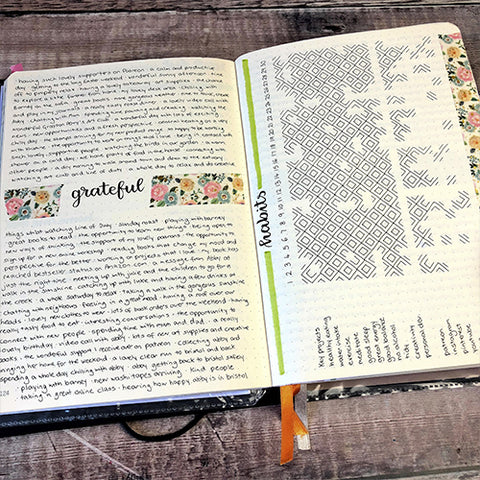
Keeping a journal is a deeply personal experience that enables to you let out your thoughts, feelings, worries and hopes. It’s a safe place to express yourself, and your journal is a wonderful expression of who you really are.
The Benefits of Keeping a Journal
There are so many benefits that you can achieve as a result of keeping a journal. These can include:
- Enabling you to draw a line and move on after a difficult day.
- Allowing you to see a fresh perspective on something when you take time to reflect fully on a situation.
- The ability to plan out big goals and visualise your dream life.
- An increased sense of relaxation and general well-being, by taking some time just for you.
- Ensuring that special moments for you and your family are documented in a beautiful way.
- Allowing you to track your progress over the years.
- A place to get creative without needing to worry about perfection.
- A system to organise your thoughts and stop them swirling around in your head.
A lot of research has been carried out into the benefits of journaling and these include:

- Journaling encourages you to explore language as you look for new ways to express yourself. An increased vocabulary has a positive correlation with intelligence.
- Keeping a journal is linked closely to mindfulness as it enables you to deeply engage with your thoughts, whilst focusing on the present moment. The focus required to write in your journal helps you to concentrate and keep your mind on track.
- Writing down goals in your journal helps send a clear message to your brain that these things are important to you. This keeps you more focused and in tune with opportunities as they arise.
- Improved Emotional Intelligence: writing down your thoughts and emotions leads to increased self-awareness, which in turn helps you to build empathy with others. This can help strengthen your relationships and enables you to have a greater understanding of the emotions that other people are feeling.
- There is a strong relationship between your brain and your hands. When you write things down, it helps to boost your memory, in a way that typing alone doesn't usually achieve.
- By reliving positive experiences in your journal it can help build your self-confidence, as you are reminded of moments that made you feel good about yourself.
- Positive Mental Health: keeping a journal has been proven to help with depression, anxiety and stress. Studies show that writing down your thoughts can help you to sleep and feel more relaxed, which can also have benefits for your physical health.
- 'Opening Up by Writing it Down' by Dr James Pennebaker states that keeping a journal lowers depression and anxiety as it strengthens the immune cells called T-lymphocytes. Writing down your feelings enables you to express yourself and impose structure on anxious feelings, which reduces stress and its physical impact on your body.
Come up with a Routine
Just like any other new habit you would like to introduce, setting up a routine can really help you bring journaling into your daily life. It’s important to be realistic about how much time you have available each day, so I would recommend starting off with 'little and often' as the best approach. Things to consider when setting up your routine are:
- What is the best time of day for you to get some quiet time?
- What would you most like to get out of your journaling time?
- Where do you feel most comfortable and at ease?
- How much time would you like to spend writing in your journal each day?
- What would a successful journaling practice look like to you?
Which Type of Journal Should You Keep?

There are so many different ways to keep a journal and the right one for you will probably depend on your answers to the questions above. Some of the options you could consider are:
- Bullet Journal: to help you keep organised and plan out big goals.
- Daily Journal: somewhere to record a few notes from each day, along with special moments.
- Reflective Journal: a place to let out your thoughts and feelings, perhaps along with some creativity.
- Art Journal: if colour and texture mean a lot to you, this could be the perfect way to express yourself.
- Junk Journaling: a great way to use up scraps of paper, envelopes and anything else that might usually be thrown away.
There are lots of wonderful notebooks available and I would recommend looking out for ones with great paper quality and that lay flat. This can really help with your enjoyment of writing in a journal.
Page Ideas
Over time you will no doubt find the type of journal pages that bring you the most benefit. However, to help you get started you could think about trying some of these pages:
- Gratitude: a lovely way to help you focus on the positive things from each day.
- Be Proud: rather than worrying about the things that haven’t gone to plan, try offering yourself a little praise at the end of each day.
- Let your Feelings Out: use your journal to let out all your negative thoughts and feelings. You could then cover them up with paint, collage or anything you like, before reframing your thoughts in a more positive way.
- Write down positive quotes and what they mean to you.
Whichever type of journal you decide to keep, please remember there are no rules and perfection is not required. Use it in the way that works best for you and make sure you take time out for yourself on a regular basis.
